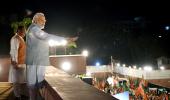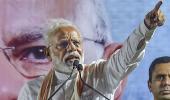...Even if it means less democracy, so that their everyday problems get solved? argues R Jagannathan.

The Gothenburg-based V-Dem institute has again ruffled feathers in India by categorising India as 'one of the worst autocratisers' in the world.
Every succeeding year since 2018, when V-Dem first called India an 'electoral autocracy', the verbiage in its annual reports has only gotten worse.
It is not my purpose here to question the V-Dem methodology and point out its obvious problems.
But there is always going to be a tension between freedom and authority because all States -- whether democratic or authoritarian or somewhere in between -- need the power to do whatever they want to do.
Power is the crucial element that legitimises the State.
Every major democracy (or autocracy) is in a category of one for the simple reason that the starting and current conditions are different for almost everybody.
Whether a country will be more autocratic or more democratic at any point of time depends a lot on its core culture, its degree of diversity, economic conditions, demographic trends, and internal and external threat perceptions.
A country that wants quick, radical change will tend to be less democratic because big change needs more concentration of power.
In his famous work Open Society and its Enemies, philosopher Karl Popper refers to three paradoxes -- the 'paradox of democracy', the 'paradox of freedom', and the 'paradox of tolerance'.
The first paradox, of democracy, relates to the fact that in a free society, people may sometimes elect autocrats.
The second paradox relates to the problem that unlimited freedom could facilitate rule by the strong over the weak, the majority over the minority, and hence there must be restraints on the freedoms enjoyed by the powerful.
As for the paradox of tolerance, Popper famously noted in the end-notes to his book: 'If we extend unlimited tolerance even to those who are intolerant, if we are not prepared to defend a tolerant society against the onslaught of the intolerant, then the tolerant will be destroyed, and tolerance with them.'
The question we must ask is this: If some people have to decide what constitutes intolerance, and where the 'tolerant' will draw the line (limit the democratic rights and freedoms of those they deem intolerant), democracy and autocracy are two sides of the same coin.
Democracy can be sustained only by some monopolies of power vested in some institutions deemed important.
One obvious example is the extraordinary powers invested in the judiciary, which in most countries is not just protected from libel and contempt, but is effectively accountable to none.
Another is the bureaucracy. No country can run without an administrative service, but this group can become an unaccountable power unto itself.
Consider how many unions fought for and got the right to go back to the old pension scheme.
Citizens willy-nilly agree to give governments greater powers whenever threats (real or perceived) from violent non-state actors (aka 'terrorists') are deemed to be very high.
After 9/11, the US enacted its so-called Patriot Act, which gives Uncle Sam huge powers of surveillance to prevent terrorism on US soil.
These powers have been used to legitimise assassinations on foreign soil.
In Denmark, after widespread Islamist threats to some publications that published cartoons of the Prophet, the country has legislated banning 'inappropriate treatment of religious books'.
Among other things, the Koran cannot be burnt in a country that once thought of itself as the bastion of free speech.
In contrast, we in India can burn the Manu Smriti any number of times in public and still be deemed to be autocratic.
On the converse side, India's Model Code of Conduct during elections would be considered a negative for free speech anywhere else, but we think this 'electoral autocratisation' is healthy for our democracy.
More recently, Ireland and other European countries (and also Scotland) are planning to (or have already legislated) laws to prevent 'hate speech', and Britain has widened the definition of 'extremism' to include 'the promotion or advancement of an ideology based on violence, hatred or intolerance' that could impact other people's rights, including those that 'undermine, overturn or replace the UK's system of liberal parliamentary democracy and democratic rights'.
The new definition, prompted by public calls for the annihilation of Jews, could potentially have a chilling effect on free speech since it could be used to stifle voices critical of Israel's actions or even some policies of the government that support Israel.
Then, of course, we have threats to democratic freedoms from the private sector.
Platforms such as Facebook, Instagram, X, and even e-mail services like Gmail have huge power to censor and regulate free speech.
We saw this in January 2021, when they collectively deplatformed a sitting US president, apparently because Donald J Trump instigated riots on Capitol Hill.
Today, the same 'democracy', aided by the 'liberal' media, is using every trick in the legal book, and some outside it, to prevent Mr Trump from contesting the November presidential elections.
All these manoeuvres may seem justified if you think Mr Trump is the next Hitler, but why would a future establishment not use the same powers to prevent a genuine critic from being elected?
In India, as we face another contentious election, there is a tendency to make over-the-top accusations against the government in power because many people consider its re-election a certainty.
But are we more authoritarian just because Narendra Modi is in power, or is our Constitution designed to tilt in favour of centralisation of power?
Wasn't Article 19(2), which puts strong restraints on free speech, hard-coded into the Constitution even before it was brought into force?
Also, how much of the cribbing against Mr Modi's 'fascism' is actually a rant against making the State more competent in combating crime, tax evasion, and fraud?
Is more State effectiveness seen as more authoritarian when earlier the expectation was that the powerful will always manage to evade the law?
While the Opposition is right to point out the selective nature of tax and enforcement actions against their leaders, this does not automatically imply that the actions themselves are wrong.
We all know that the law works better for those with the money to litigate than for those with limited resources, but we then blame the system, not the law itself.
We need better checks on how the law is used.
There is no perfect democracy anywhere. All democracies must be humble enough to accept that they are works in progress.
The only good democracy is one which has the ability to constantly reinvent itself.
That, unfortunately, is not the case with any country anywhere today where complex problems -- excess immigration, terrorism, inequality, climate change, et al -- remain unsolved precisely because democracies seem incapable of finding the consensus needed to move ahead.
Is it any wonder many voters seem to prefer strong leaders, even if it means less democracy, so that their everyday problems get solved?
R Jagannathan is editorial director, Swarajya magazine
Feature Presentation: Aslam Hunani/Rediff.com











